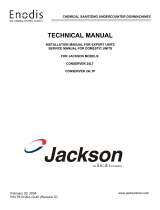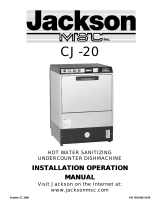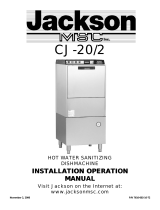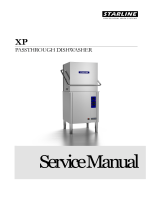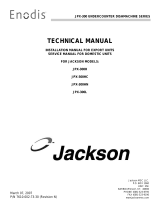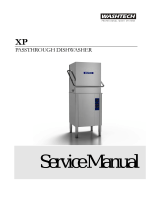Page is loading ...

SERVICE MANUAL
FOR JACKSON MODELS:
JPX-140
JPX-160
JPX-200
Jackson MSC, Inc.
P.O. BOX 1060
HWY. 25E
BARBOURVILLE, KY. 40906
FAX (606) 523-9196
PHONE (606) 523-9795
www.jacksonmsc.com
An
Company
HOT WATER SANITIZING UNDERCOUNTER DISHMACHINES
April 30, 2004
P/N 7610-002-68-17 (Revision E)

This page intentionally left blank.

SECTION DESCRIPTION PAGE
I. INSTRUCTIONS
Installation Instructions 1
Chemical Dispensing Equipment 2
Chemical Timer Adjustments 3
Operation Instructions 5
PC Board 7
II. TROUBLESHOOTING 8
III. JPX-140
Specifications of the JPX-140 9
Dimensions JPX-140 10
Front Assembly 11
Electrical Panel 12
Front and Bottom View 13
Wash Arm/Rinse Arm Assemblies 15
Inside Tub View 17
Rear View 18
Miscellaneous 19
Electrical Diagram: 208-240 Volt, 60 Hertz, 1 Phase 20
IV. JPX-160
Specifications of the JPX-160 21
Dimensions JPX-160 22
JPX-160 Front View 23
Electrical Panel 24
Front and Bottom View 25
Rear View 27
Wash Arm/Rinse Arm Assemblies 28
Inside Tub View 30
Miscellaneous 31
Electrical Diagram: 208-240 Volt, 60 Hertz, 1 Phase 32
Electrical Diagram: 12 Volt Circuit 33
JPX-160 Components Diagram 34
V. JPX-200
Specifications of the JPX-200 35
Dimensions JPX-200 36
Main Assembly 37
Electrical Panel 38
Front and Bottom View 39
Rear View 41
Wash Arm/Rinse Arm Assemblies 42
Inside Tub View 43
Miscellaneous 44
Electrical Diagram: 208-240 Volt, 60 Hertz, 1 Phase 45
Electrical Diagram: 12 Volt Circuit 46
JPX-200 Components 47
TABLE OF CONTENTS
i
C
O
N
T
E
N
T
S

VISUAL INSPECTION: Before installing the unit, check the container
and machine for damage. A damaged container is an indicator that
there may be some damage to the machine. If there is damage to both
the container and machine, do not throw away the container. The dish-
machine has been inspected and packed at the factory and is expect-
ed to arrive to you in new, undamaged condition. However, rough han-
dling by carriers or others may result in there being damage to the unit
while in transit. If such a situation occurs, do not return the unit to
Jackson; instead, contact the carrier and ask them to send a repre-
sentative to the site to inspect the damage to the unit and to complete
an inspection report. You must contact the carrier within 48 hours of
receiving the machine. Also, contact the dealer through which you pur-
chased the unit.
UNPACKING THE DISHMACHINE: Once the machine has been
removed from the container, ensure that there are no missing parts
from the machine. This may not be obvious at first. If it is discovered
that an item is missing, contact Jackson immediately to have the miss-
ing item shipped to you.
LEVEL THE DISHMACHINE: The dishmachine is designed to oper-
ate while being level. This is important to prevent any damage to the
machine during operation and to ensure the best results when wash-
ing ware. The unit comes with adjustable bullet feet, which can be
turned using a pair of channel locks or by hand if the unit can be
raised safely. Ensure that the unit is level from side to side and from
front to back before making any connections.
PLUMBING THE DISHMACHINE: All plumbing connections must
comply with all applicable local, state, and national plumbing codes.
The plumber is responsible for ensuring that the incoming water line
is thoroughly flushed prior to connecting it to any component of the
dishmachine. It is necessary to remove all foreign debris from the
water line that may potentially get trapped in the valves or cause an
obstruction. Any valves that are fouled as a result of foreign matter left
in the water line, and any expenses resulting from this fouling, are not
the responsibility of the manufacturer.
CONNECTING THE DRAIN LINE: The JPX-140 model covered in
this manual has a gravity discharge drain. Remove the drain plug from
the tub and the unit will drain itself. The unit comes with a flexible drain
hose that should be connected to the drain. The drain hose connec-
tion must drain downward and away from the machine.
The drain for the JPX-160 & JPX-200, is a pumped discharge drain.
Both of these dishmachines must be drained into a stand pipe (like a
household washing machine). If they are not, they will siphon them-
selves empty. The stand pipe for the JPX-160 is between 20 and 24
inches tall. The stand pipe for the JPX-200 is between 24 and 28 inch-
es tall. All piping from the machine to the drain must be a minimum 1”
I.P.S. and shall not be reduced.
There must also be an air gap between the machine drain line and the
floor sink or drain. If a grease trap is required by code, it should have
a flow capacity of 5 gallons per minute.
PRIMING THE DRAIN LINE: For the JPX-160 and JPX-200 models,
prime the drain pump before use when the machine is full of water.
Lower the end of the drain hose and allow some water to drain from
the hose. Raise the end of the hose and connect it to its installation
position.
WATER SUPPLY CONNECTION: Ensure that you have read the sec-
tion entitled “PLUMBING THE DISHMACHINE” above before pro-
ceeding. Install the water supply line (1/2” pipe size minimum) to the
to the vacuum breaker on the back of the machine. For ease of ser-
vice, the final water line connection to the machine should be using a
length of flexible hose, suitable for the pressure and temperature of
the incoming water. It is recommended that a water shut-off valve be
installed in the water line between the main supply and the machine
to allow access for service.
The water supply line is to be capable of 20 A5 PSI “flow” pressure
at the recommended temperature indicated on the data plate.
In areas where the water pressure fluctuates or is greater than the
recommended pressure, it is suggested that a water pressure regula-
tor be installed. The JPX series units do not come with water pressure
regulators as standard equipment.
Do not confuse static pressure with flow pressure. Static pressure is
the line pressure in a “no flow” condition (all valves and services are
closed). Flow pressure is the pressure in the fill line when the fill valve
is opened during the cycle.
It is also recommended that a shock absorber (not supplied with the
JPX series units) be installed in the incoming water line. This prevents
line hammer (hydraulic shock), induced by the solenoid valve as it
operates, from causing damage to the equipment.
PLUMBING CHECK: Slowly turn on the water supply to the machine
after the incoming fill line and the drain line have been installed.
Check for any leaks and repair as required. All leaks must be repaired
prior to placing the machine in operation.
ELECTRICAL POWER CONNECTION: Electrical and grounding con-
nections must comply with the applicable portions of the National
Electrical Code ANSI/NFPA 70 (latest edition) and/or other electrical
codes.
Disconnect electrical power supply and place a tag at the disconnect
switch to indicate that you are working on the circuit.
Refer to the data plate for machine operating requirements,
machine voltage, total amperage load and serial number.
To install the incoming power lines for the JPX-140, route the power
lines through the grommet located in the rear AT THE TOP OF THE
MACHINE.
WARNING: do not attempt to route incoming power lines
to the dispenser terminal block located at the bottom of
the JPX-140! Contact your authorized Jackson service agency or
Jackson technical service if there are any questions.
To install the incoming power lines for the JPX-160 & JPX-200 route
the power lines through the grommet located at the rear of the
machine towards the bottom. Install the service wires (L1, L2 &
Ground) to the appropriate terminals on the terminal block. It is rec-
ommended that “DE-OX” or another similar anti-oxidation agent be
used on all power connections.
VOLTAGE CHECK: Ensure that the power switch is in the OFF posi-
tion and apply power to the dishmachine. Check the incoming power
at the terminal block and ensure it corresponds to the voltage listed on
the data plate. If not, contact a qualified service agency to examine
the problem. Do not run the dishmachine if the voltage is too high or
too low. Shut off the service breaker and mark it as being for the dish-
machine. Advise all proper personnel of any problems and of the loca-
tion of the service breaker. Replace the control box cover and tighten
down the screws.
INSTALLATION INSTRUCTIONS
1
I
N
S
T
R
U
C
T
I
O
N
S

This page does not apply to the JPX-140 dishmachine. This unit is not supplied with chemical pumps.
The JPX-160 and JPX-200 dishmachines are supplied with detergent and rinse additive chemical feeder pumps.
TO PREPARE PUMPS FOR OPERATION
Locate the open ends of the chemical tubes, insert the end of each tube onto the hub on the brass weight, and place each one in the
appropriate container.
A. Red Tubing = Detergent
B. Blue Tubing = Rinse Aid
PRIMING CHEMICAL FEEDER PUMPS
Chemical feeder pumps need priming when the machine is first installed or if for some reason the chemical lines have been removed
and air is allowed to enter.
CAUTION: Water must be in the sump and wash tank prior to the dispensing of chemicals.
1. Verify that the proper chemical tube inlet is in the correct container.
2. The detergent pump shall prime itself, provided there is sufficient chemical available.
3. Detergent is automatically dispensed as required during the wash cycle.
4. When it is required to fill the rinse agent tubes, e.g. on installation or if the container has been allowed to empty, the system may be
primed as follows:
a) Ensure a cycle is not in progress.
b) Press and hold the drain switch until “rinse-prime” appears in the display.
c) On models with drain pump the message “draining” will appear first. The message “rinse-prime” will appear after a fur-
ther few seconds. DO NOT release the switch when the “draining” message is showing, as this will start a drain cycle.
If this is accidentally done, switch off to cancel the drain cycle.
d) The rinse-agent pump will run until the switch is released.
e) Observe the rinse agent travelling along the tube. Release the switch when the tubing is full.
Warning: Some of the chemicals used in dishwashing may cause chemical burns if they come in contact with your skin.
Wear appropriate protective gear when handling these chemicals. If you do come in contact with these chemicals flush
the area with fresh water.
This equipment is not recommend for use with deionized water or other aggressive fluids. Use of deionized water or
other aggressive fluids will result in corrosion and failure of materials and components. Use of deionized water or other
aggressive fluids will void the manufacturer's warranty.
CHEMICAL DISPENSING EQUIPMENT
2
I
N
S
T
R
U
C
T
I
O
N
S

This page does not apply to the JPX-140 dishmachine.
In general, it should not be necessary to alter the machine settings. The factory settings have been established to give the best results.
IMPORTANT: To avoid wasting chemicals, remove tubes from soap and rinse-agent bottles before using the Service Mode. The sys
-
tem will always give an initial dose during the first cycle after switch-on, even though the wash tank may still be full.
TO ENTER ENGINEERING MODE WITHOUT REMOVING THE TOP PANEL:
PREPARATION: Open the door and observe at the top right of the door frame. Notice the door switch shaft by which the door switch
is operated. This serves as the “enter” button.
The “mode” switch is used to scroll between menu options and variable values.
TO ENTER ENGINEERING MODE:
1. Turn machine off, wait until the display is blank.
2. Open the door and hold a pencil or similar item against the door switch shaft.
3. Switch on and as soon as the display appears press the door switch shaft 5 times within 4 seconds.
4. The display should change to “rinse overlap”, thus showing you are in the Engineering Mode.
Scrolling through the menu is achieved by use of the two switches mentioned above; it must be switched off (“down” position) to stop
the scrolling.
DANGER: DO NOT start the FILL test or the WASH PUMP test by pressing the door switch button. Close the door instead
because water will start spraying.
NOTE: If it is necessary to abandon a test or other operation in the Service Mode, or when you wish to revert to normal use, switch
OFF and ON again.
CHEMICAL TIMER ADJUSTMENTS
3
I
N
S
T
R
U
C
T
I
O
N
S

Use the chart below to determine the initial time values for INITIAL RINSE, CYCLE RINSE, INITIAL SOAP, and CYCLE SOAP based
on the desired concentration of the chemical being used. Check the concentration of the chemicals after running a few cycles and read
-
just as necessary.
CHEMICAL TIMER ADJUSTMENTS CONTINUED
4
JPX-160
Chemical Ratio Chemical Chemical Initial Cycle Initial Cycle
(parts water to Concentration Concentration Rinse Rinse Detergent Detergent
one part chemical) (percent in water) (ounces per (sec) (sec) (sec) (sec)
10 gallons water)
5000 0.02% 0.3 7 4 3 1
3000 0.03% 0.4 12 7 5 1
2500 0.04% 0.5 14 8 6 2
2000 0.05% 0.6 18 10 8 2
1500 0.07% 0.9 24 14 10 3
1000 0.10% 1.3 36 20 16 4
800 0.13% 1.6 45 26 20 5
600 0.17% 2.1 60 34 26 6
400 0.25% 3.2 90 51 39 9
300 0.33% 4.3 119 68 52 13
250 0.40% 5.1 143 82 63 15
200 0.50% 6.4 179 102 78 19
I
N
S
T
R
U
C
T
I
O
N
S
JPX-200
Chemical Ratio Chemical Chemical Initial Cycle Initial Cycle
(parts water to Concentration Concentration Rinse Rinse Detergent Detergent
one part chemical) (percent in water) (ounces per (sec) (sec) (sec) (sec)
10 gallons water)
5000 0.02% 0.3 11 5 8 1
3000 0.03% 0.4 18 9 14 2
2500 0.04% 0.5 22 10 16 2
2000 0.05% 0.6 27 13 21 2
1500 0.07% 0.9 36 17 27 3
1000 0.10% 1.3 54 26 41 5
800 0.13% 1.6 67 32 52 6
600 0.17% 2.1 90 43 69 8
400 0.25% 3.2 134 64 103 12
300 0.33% 4.3 179 85 137 16
250 0.40% 5.1 215 102 165 19
200 0.50% 6.4 269 128 206 24

PREPARATION: Before proceeding with the start-up of the unit,
verify the following:
1. Remove all solid wastes in order to avoid obstructing strainers,
drain and wash jets.
2. Ware that is encrusted with soil should be presoaked prior to
being placed in the machine.
3. When placing dishes into the racks, do not allow them to lean
on each other.
4. Place cups and similar items upside down in the racks.
5. Ensure that the drain stopper is inserted and tight on units sup-
plied with a drain stopper.
6. Ensure that the wash arms are installed and secure.
POWER UP: To energize the unit, turn on the power at the service
breaker. The voltage should have been previously verified as
being correct. If not, the voltage will have to be verified.
FILLING THE WASH TUB:
JPX-140: Put the Blue Mode Switch in the STANDBY (up) posi-
tion. Ensure that the door is closed completely and place the
Power Switch in the ON position (the switch should illuminate).
The unit will begin to fill with water in both the wash tank and the
rinse tank.
JPX-160/JPX-200: For the initial fill, put the Power Switch in the
ON position and the AUTO/STANDBY Switch in STANDBY. Close
the door. The unit will automatically fill.
Note: Depending upon the wash temperature, the unit may go into
a FAST HEAT cycle. The machine will fill and drain water from the
rinse tank into the wash tank to get the wash temperature up to
the minimum (150° F) temperature.
The unit will stop filling once the correct level is attained. Ensure
that the unit is level and that incoming flow pressure is 20A5 PSI.
To prevent a cycle from starting after the door is closed, the Mode
Switch must be turned to “STANDBY” before the door is closed.
WARM UP CYCLES: Warm-up cycles are not required on the
JPX-140 dishmachine. When the machine reaches the proper
operating temperatures, the blue “READY” light on the front panel
will be illuminated.
WARE PREPARATION: Proper preparation of ware will help
ensure good results and less re-washes. If not done properly,
ware may not come out clean and the efficiency of the dishma-
chine will be reduced. It is important to remember that a dishma-
chine is not a garbage disposal and that simply throwing
unscraped dishes into the machine simply defeats the purpose
altogether of washing the ware. Scraps should be removed from
ware prior to being loaded into a rack. Pre-rinsing and pre-soak-
ing are good ideas, especially for silverware and casserole dish-
es. Place cups and glasses upside down in racks so that they do
not hold water during the cycle. The dishmachine is meant not
only to clean, but to sanitize as well, to destroy all of the bacteria
that could be harmful to human beings. In order to do this, ware
must be properly prepared prior to being placed in the machine.
DAILY MACHINE PREPARATION: Refer to the section entitled
“PREPARATION” at the top of this page and follow the instructions
there. Afterwards, check that all of the chemical levels are correct
and/or that there is plenty of detergent available for the expected
workload.
WASHING A RACK OF WARE:
JPX-140: To wash a rack of ware, open the door completely
(being careful of for hot water that may drip from the top of the
unit), manually load the detergent into the wash chamber, and
slide the rack into the unit. Wait until the blue “READY” light on the
front panel is illuminated, indication that the water in the machine
has been heated to the proper operating temperature. Put the
STANDBY Switch into the the AUTO (down) position. Close the
door and the unit will start automatically. Once the cycle is com
-
pleted, open the door (again watching for dripping hot water) and
remove the rack of clean ware and allow ware to air dry. Replace
with a rack of soiled ware and close the door. The process will
then repeat itself.
JPX-160/JPX-200: Once the display indicates “unit ready”, open
the door. Place the rack of soiled ware in the unit. Put the
AUTO/STANDBY Switch in the AUTO position. Select the desired
wash cycle length (2 or 4 minutes) by placing the Cycle Switch in
the desired position (up for 2 minutes and down for 4 minutes).
Close the door. The machine will start automatically. Once the
cycle is completed, open the door and remove the rack of clean
ware. Replace with a rack of soiled ware and close the door. The
cycle will begin again.
OPERATIONAL INSPECTION: Based upon usage, the wash
strainers may become clogged with soil and debris as the work
-
day progresses. Operators should regularly inspect the wash
strainer to ensure it has not become clogged. If the strainers do, it
will reduce the washing capability of the machine. Instruct opera
-
tors to clean out the wash strainer at regular intervals or as
required by work load.
SHUTDOWN AND CLEANING: At the end of the workday, close
the door. Wait until the cycle is complete and the MODE Switch
lamp is out. Move the MODE Switch UP into the STANDBY posi
-
tion, open the door to remove the last rack of ware. On pumped
drain machines, the RIGHT hand switch is blue. On units supplied
with a drain stopper, remove the drain stopper and put in a safe
place. (NOTE: The wash tank water will be hot so caution is
advised). Close the door. Press and hold down the Drain Switch
until the message “DRAINING” appears. IMMEDIATELY release
the switch and the drain cycle will start. The display will tell you
when the cycle is complete. Move the POWER Switch to Off posi
-
tion.
OPERATION INSTRUCTIONS
5
I
N
S
T
R
U
C
T
I
O
N
S

SHUTDOWN AND CLEANING: Remove the central knob (A) to
remove the wash arms. Check the nozzles to ensure they are not
clogged with debris. If they are, simply unscrew the nozzle retain-
er for the affected nozzle and remove it to clean out the debris.
Flush the arms out with fresh water. IMPORTANT: Remove only
one nozzle at a time to ensure that you replace all of the nozzles
as required. Each of the wash nozzles are embossed with either
an S or a D. Use the diagrams to the right to refer to nozzle
placement. The are no differences in each of the rinse nozzles.
Remove the lower deflector washer (B) and clean. Notice how the
washer for the lower arm is installed with the lip up. This is very
important. If the deflector washer is not re-installed the same way,
wash performance will suffer tremendously. The upper deflector
washer (C) is only removable by removing the screws that attach
it to the top of the unit. In the event this reflector is removed to be
cleaned, make sure it is reattached with the lip facing downward
away from the top of the unit as shown in the picture below.
Remove the rear, left and right strainer supports and clean as
required. Remove the wash and drain strainers and clean them as
required. Wipe out the entire tub. Use a damp cloth to clean the
tank, never use abrasive material such as steel wool or a wire
brush to clean the tank. Use only cleaners specified for stainless
steel and always follow the manufacturer’s instructions on use of
the cleaner.
WARNING: Do not use substances containing chlorine or bleach
or anything containing hypochlorite compounds, as these chemi-
cals will damage the stainless steel surfaces, and in time will ren-
der the machine useless. Such damage is not covered by the war-
ranty.
OPERATION INSTRUCTIONS (CONTINUED)
6
A
B
C
Rinse Arms
(Thinner)
Wash Arms
(Thicker)
JPX-140
Wash/Rinse Arm
Assembly
Blank
Rinse Arms
Wash Arms
Blank
Blank
Rinse Arms
Wash Arms
Blank
D
S
D
S
JPX-160
Wash/Rinse Arm
Assembly
S D
S
D
JPX-200
Wash/Rinse Arm
Assembly
D
S
D S
I
N
S
T
R
U
C
T
I
O
N
S

PC BOARD
7
Scroll Down
Scroll Up
Enter
Red lights will illuminate when the
corresponding output signal is “on”.
For use only in the
engineering/programming
mode only
Green LED
Display Contrast Adjuster. Turn clockwise to adjust the
brightness of the display. It will not unscrew. When it reach-
es the brightest spot, it will restart at the dimmest setting.
I
N
S
T
R
U
C
T
I
O
N
S

WARNING: Inspection, testing and repair of electrical equipment should be performed only by qualified service personnel. Certain
procedures in this section require electrical tests or measurements while power is applied to the machine. Exercise extreme caution
at all times. If test points are not easily accessible, disconnect power, attach test equipment and reapply power to test. When replac
-
ing electrical parts, disconnect power at source circuit breaker.
Problem: The tank does not fill up, machine does not start, or the dishmachine does not rinse.
1. Check that the water supply valve is open.
2. Check the water softener supply and connections.
3. Check the connections and fuses of the supply.
4. Examine the air vessel at the rear right of the wash tank. When the machine is empty, the lower edge of this vessel must not be
touching the water remaining in the tank. This situation can be avoided by a small adjustment to the feet or legs, to tilt the machine
slightly forwards.
Problem: The tank only fills up very slowly.
1. Check that the water supply is giving good pressure.
2. Check that the water line pressure during the fill or rinse is in the range of 15 to 25 PSI. If it is lower, ask your dealer to fit a boost
-
er pump to increase pressure.
3. Check that the rinse jets are not blocked by limescale or solid wastes.
4. Check if water hoses are trapped or kinked.
5. Check if the bushing at the center of the wash/rinse arm assemblies are loose or missing - this allows dirt into the rinse jets, which
may be blocked.
Problem: Water marks on glasses.
1. Use correct chemicals, which do not produce foam and which are specially designed for this type of commercial dishmachine.
2. Check that rinse jets are not blocked and the water pressure is adequate.
3. Check the water hardness. If there is any sign of grey or brown deposits on the inside of the tank or on the wash elements, you
probably have hard water. Ask your dealer to install a water softener.
Problem: Wash arms do not rotate freely.
1. Disassemble the wash arms and carefully clean, as described above. Check for signs of limescale deposit; a water softener may
be required.
2. Check that the inlet pressure is higher than 2 1/2 bar (static) or 1 to 1 1/2 bar during fill or rinse. If it is lower, ask your dealer to fit
a pump to increase the pressure.
3. Check if the deflector disc is missing or is upside down (should be the same way up as a saucer).
4. Check if the bushes at the center of the rotating arm assemblies are loose or missing - this allows dirt into the rinse jets, may be
blocked.
TROUBLESHOOTING SECTION
8
T
R
O
U
B
L
E
S
H
O
O
T
I
N
G

PERFORMANCE/CAPABILITIES
OPERATING CAPACITY (RACKS/HOUR)
RACKS PER HOUR 13
DISHES PER HOUR 91
GLASSES PER HOUR 260
OPERATING CYCLE (SECONDS)
WASH TIME 226
RINSE TIME 14
TOTAL CYCLE TIME 240
TANK CAPACITY (GALLONS)
WASH TANK 2.8
BOOSTER TANK 1.25
TEMPERATURES
WASH---°F (MINIMUM) 150
RINSE---°F (MINIMUM) 180
ELECTRICAL REQUIREMENTS
WASH PUMP MOTOR HP 1/2
NOTE: Typical Electrical Circuit is based upon (1) 125% of the
full amperage load of the machine and (2) typical fixed-trip
circuit breaker sizes as listed in the NEC 2002 Edition. Local
codes may require more stringent protection than what is
displayed here. Always verify with your electrical service
contractor that your circuit protection is adequate and meets
all applicable national and local codes. These numbers are
provided in this manual simply for reference and may change
without notice at any given time.
RINSE TYPICAL
HEATER TOTAL ELECTRICAL
VOLTS PH HZ RATINGS AMPS CIRCUIT
208 1 60 2.7 KW@208V 24 30 AMP
230 1 60 3.3 KW@230V 26 35 AMP
WATER REQUIREMENTS
INLET TEMPERATURE 140°F
WATER LINE SIZE I.P.S. (Minimum) 1/2”
DRAIN LINE SIZE I.D (Minimum) 1”
FLOW PRESSURE P.S.I. 20 A5
GALLONS PER RACK .49
GALLONS PER HOUR 6.4
NOTE: Always refer to the machine data plate for specific
electrical and water requirements. The material provided on
this page is for reference only and may be subject to change
without notice.
This equipment is not recommend for use with deionized
water or other aggressive fluids. Use of deionized water or
other aggressive fluids will result in corrosion and failure of
materials and components. Use of deionized water or other
aggressive fluids will void the manufacturer's warranty.
SPECIFICATIONS of the JPX-140
9
J
P
X
1
4
0

DIMENSIONS of the JPX-140
10
2 1/2” MIN. WALL CLEARANCE
A. 1/2” FNPT 140BF. WATER CONNECTION
B. DRAIN HOSE CONNECTION FOR GRAVITY DRAIN FROM THE
UNIT. UNIT SUPPLIED WITH 1” I.D. X 1 1/2” O.D. X 6’-0” LONG
FLEXIBLE HOSE.
C. ELECTRICAL CONNECTION
D. DISPENSER CONNECTION
18”
27 7/8”
11 7/16”
29 7/16”
18”
4”
2 3/4”
8 1/2”
11”
INSIDE
CLEARANCE
REAR VIEW OF UNIT
SHOWING CONNECTIONS
16 3/4”
17”
2 1/2”
8 1/2”
22 1/2”
C
A
B
D
DOOR IN OPEN POSITION
J
P
X
1
4
0

ITEM QTY DESCRIPTION Mfg. No.
01 1 Door Microswitch with Assembly 2020-162-27-23
02 1 ON/OFF Switch 2020-142-27-10
03 1 Mode Switch 2020-142-27-11
04 1 Ready Light 2020-142-27-18
05 1 Metal Facia Plate for Switches 2020-142-67-95
06 1 Black Plastic Top Panel 2020-142-27-34
07 1 Wash Gauge 2020-142-67-97
08 1 Handle 2020-162-27-73
09 1 Door 2020-142-27-50
10 1 Rinse Gauge 2020-142-67-96
11 1 Lower Front Panel 2020-142-27-53
12 1 Rinse Gauge 2020-162-27-60
FRONT ASSEMBLY
11
02 03 0504 06
01
08
09
10
1
11
07
12
J
P
X
1
4
0

ITEM QTY DESCRIPTION Mfg. No.
01 1 Contactor, 240V 2020-142-28-54
02 1 Contactor, 240V 2020-142-28-54
03 1 Contactor, 240V 2020-142-28-54
04 1 Relay, 240V, 4 Pin 2020-142-28-50
05 1 Relay, 240V, 5 Pin 2020-142-28-51
06 1 Relay, 240V, 4 Pin 2020-142-28-50
07 1 Timer, 2 Minute 2020-142-27-06
07 1 Timer, 4 Minute 2020-142-37-21
08 1 Relay, 240V, 4 Pin 2020-142-28-50
09 1 Black Plastic Support for Facia 2020-162-28-11
10 1 Door Microswitch with Assembly 2020-162-27-23
11 1 Terminal Block 2020-162-27-20
12 1 Hose 2020-162-28-24
13 1 Grounding Nut 2020-162-27-60
14 1 Gray Pressure Switch 2020-162-27-21
15 1 Hold Down Bracket 2020-162-26-80
ELECTRICAL PANEL
12
01
02
03
04
05
06
07
08
12
13
14
15
11
10
09
J
P
X
1
4
0

FRONT AND BOTTOM VIEW
13
02 0301 04 05
06 07 08 09 10
12 13 14
11
15 16
17 18
19
11
21
20
22
23
25
06 26
19
24
09
28
24
27
24
01 07 09 10
J
P
X
1
4
0

ITEM QTY DESCRIPTION Mfg. No.
01 1 Rinse Tank 2020-142-28-03
02 1 Rinse Tank Thermal Switch 2020-142-27-16
03 1 Wash Element with Washer and Nuts 2020-162-27-04
04 2 Terminal Guard 2020-162-28-00
05 1 Nut, 1”, Plastic 2020-142-27-64
06 2 Hose Clamp 2020-162-27-59
07 1 Drain Hose 2020-162-28-06
08 1 Nut, Plastic 2020-162-27-91
09 2 Hose Clamp 2020-162-27-62
10 1 Pump Inlet Hose 2020-142-27-90
11 4 Foot, Machine 2020-162-27-43
12 3 Hex Nut 2020-162-27-93
13 1 Heater Gasket 2020-142-27-92
14 1 Rinse Heater Element 2020-142-28-49
15 1 Thermostat 2020-142-26-98
16 1 Support Bracket 2020-142-67-99
17 1 Thermostat 2020-142-26-98
18 1 Base Cover 2020-142-27-51
19 1 Terminal Block 2020-142-68-00
20 1 Washer, Fiber 2020-162-28-05
21 1 Bolt, Drain 2020-162-28-04
22 2 Screw 2020-162-27-98
23 2 Nut 2020-162-27-93
24 3 Hose Clamp 2020-162-27-60
25 1 Hose, Rinse 2020-162-28-24
26 1 Wash Pump Motor 2020-162-28-23
27 1 Valve, Solenoid Water Inlet 2020-142-27-02
28 1 Outlet Hose 2020-142-26-95
FRONT AND BOTTOM VIEW (CONTINUED)
14
J
P
X
1
4
0

WASH ARM/RINSE ARM ASSEMBLIES
15
01 02 03 04 07 08 09
29 30 31
10
26 25 24 14 13 06
21 22 23
2827
05
11 12 15 16 17 18 19 2014
J
P
X
1
4
0

ITEM QTY DESCRIPTION Mfg. No.
01 1 Rinse Arm Pipe (Cross Tube) 2020-142-68-01
02 1 Hex Nut 2020-142-26-48
03 1 Elbow, Rinse Halo 2020-142-68-02
04 1 Ramp, Left Hand Basket 2020-162-28-09
05 1 Support, Left Hand Filter 2020-142-27-55
06 6 Jet, Rinse 2020-162-26-57
07 1 Elbow, Soap Assembly 2020-162-27-35
08 2 Rinse Arm 2020-142-26-42
09 4 Rinse Jet Nozzle 2020-142-68-03
10 2 O-Ring, Wash Arm 2020-162-26-59
11 6 Nozzle Cap 2020-142-68-04
12 1 Bolt, 8mm, Spindle 2020-162-26-71
13 6 Nut, Rinse Jet 2020-162-26-56
14 1 Support, Front Filter 2020-162-28-21
15 2 Wash Arm 2020-162-26-75
16 2 Rinse Jet Support 2020-142-26-44
17 1 Support, Right Hand Filter 2020-142-27-56
18 1 Door Switch Assembly 2020-142-68-05
19 1 Ramp, Right Hand Basket 2020-162-28-10
20 2 Rinse Halo Endcap 2020-142-68-00
21 2 Pin, Hinge 2020-162-28-07
22 2 C-Clip, Hinge Pin 2020-162-27-38
23 2 Spacer, Hinge Pin 2020-162-27-39
24 1 Flange, Bottom 2020-162-26-42
25 2 O-Ring, Rinse Arm 2020-162-26-60
26 1 Center Boss 2020-202-26-39
27 1 Filter, Plastic 2020-162-28-18
28 3 Jet, Wash L/H “S” 2020-162-26-65
29 3 Jet, Wash R/H “D” 2020-162-26-54
30 1 Plug, Drain 2020-162-26-92
31 6 Nut, Wash Jet 2020-162-26-63
WASH ARM/RINSE ARM ASSEMBLIES (CONTINUED)
16
J
P
X
1
4
0

ITEM QTY DESCRIPTION Mfg. No.
01 1 Elbow Assembly 2020-162-26-46
02 1 Spacer, Bottom Spindle 2020-162-26-69
03 1 Spindle 2020-142-26-68
04 1 Bottom Boss Assembly 2020-202-26-53
05 1 O-Ring 2020-162-27-83
06 1 Base, Wash Filter 2020-142-27-87
07 1 Tube, Transfer 2020-142-26-51
08 1 Air Bell Assembly 2020-162-26-97
09 1 Hold Down Bracket 2020-142-68-07
10 1 Body, Wash Filter 2020-162-27-86
11 1 Element, Wash with Washer and Nuts 2020-162-27-04
12 1 Waste Boss 2020-162-26-94
13 1 O-Ring 2020-162-27-62
14 1 Nut, Filter 2020-162-27-82
INSIDE TUB VIEW
17
09
11
02 04
01
05
*14
07 0803
12 *13 10 *0614
* Represents an item not shown.
J
P
X
1
4
0
/

